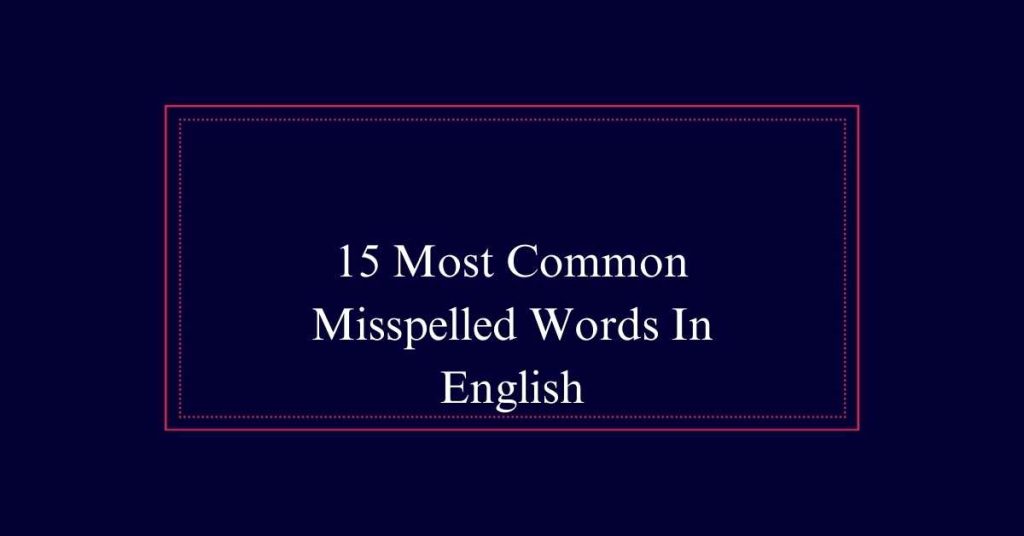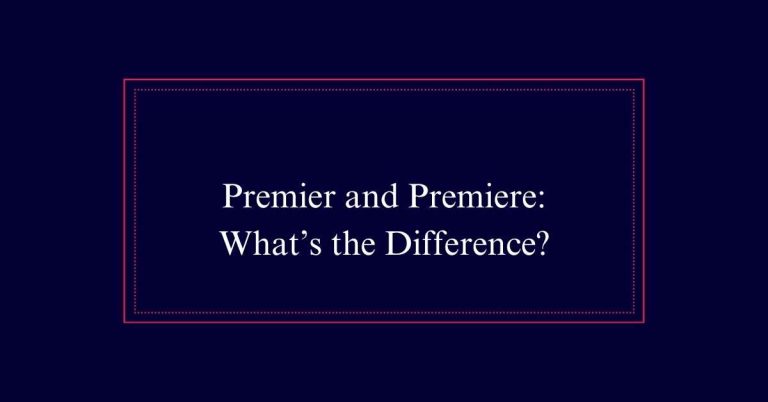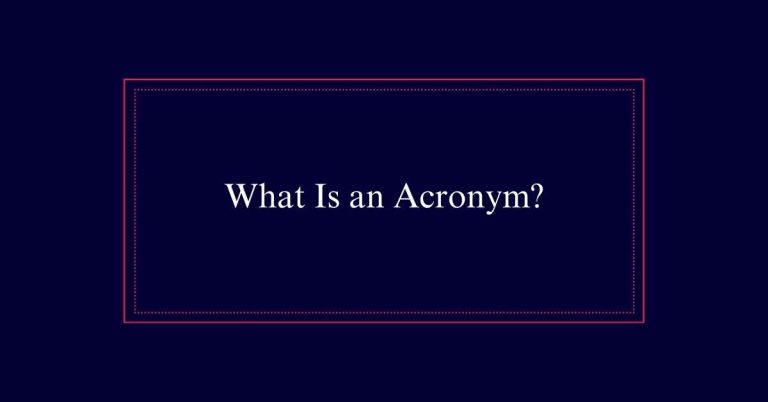15 Most Common Misspelled Words In English
Many struggle with commonly misspelled words like ‘accommodate,’ ’embarrass,’ and ‘maintenance.’ ‘Definitely’ often confuses due to its internal structure, while ‘separate’ is tricky due to its pronunciation. ‘Successful’ derives from ‘success’ with an added ‘ful,’ and ‘committee’ has double ‘m’ and ‘t’. ‘Necessary’ can be remembered with one ‘c’ and two ‘s’s, and ‘accommodation’ requires careful visualization of double letters. Mnemonics and consistent practice can greatly improve your spelling accuracy.
Accommodate
Despite its frequent use in both written and spoken English, ‘accommodate’ is often misspelled due to its double letters. Many people forget that both the ‘c’ and the ‘m’ are doubled in this word. The correct spelling is ‘a-c-c-o-m-m-o-d-a-t-e.’
This word means to provide space or to make adjustments for someone or something. Remembering the double ‘c’ and double ‘m’ can help avoid common mistakes. One mnemonic is to think of two people ‘accommodating’ each other by sharing space, hence the double letters.
Frequent practice and careful attention can improve accuracy in spelling this word correctly. Missteps in spelling can lead to misunderstandings, so it’s important to learn and remember the correct form.
Embarrass
The word ’embarrass’ is commonly misspelled because of its double ‘r’ and double ‘s’. This can be confusing for many people, leading to frequent mistakes. The correct spelling is important in both formal and informal writing.
Here is a useful table to illustrate some common mistakes and the correct form:
| Misspelled Version | Correct Version |
|---|---|
| embarass | embarrass |
| embbarass | embarrass |
| embarras | embarrass |
| embaras | embarrass |
Remembering the correct spelling involves noting the double ‘r’ and double ‘s’. Practice and repetition can help. Writing the word several times correctly can reinforce the proper spelling in your memory. This attention to detail will enhance your writing skills significantly.
Maintenance
Many people frequently misspell ‘maintenance’ due to its unusual combination of letters. Understanding the correct spelling can be simplified by breaking it down into its components. Here are some common pitfalls and tips to avoid them:
- Silent ‘e’: Remember, there is no ‘e’ after the ‘n’ in ‘maintenance’.
- Order of ‘a’ and ‘e’: The ‘a’ comes before the ‘e’ after ‘maint’.
- Suffix confusion: The ending is ‘nance’, not ‘nence’.
- Word structure: Think of it as ‘main-ten-ance’.
These points can help internalize the correct spelling. Practice and repetition are essential. Visual aids like flashcards can also be beneficial for mastering tricky words like ‘maintenance’.
Definitely
Why is ‘definitely’ so often misspelled?
The word often confuses people due to its pronunciation and letter arrangement. Many people mistakenly spell it as ‘definately’ or ‘definatly.’
The root of the problem lies in the word’s structure. ‘Definitely’ is derived from ‘definite,’ which itself is easy to misspell. The presence of a single ‘i’ after ‘n’ and the silent ‘e’ at the end make it tricky.
To remember the correct spelling, focus on the base word ‘finite,’ which means limited or having bounds. Adding the prefix ‘de-‘ and suffix ‘-ly’ should help.
Practice and repetition are key to mastering this commonly misspelled word. Being mindful of the structure will improve accuracy.
Separate
‘Separate’ is frequently misspelled due to its tricky vowel arrangement and pronunciation. The common error arises from the misplacement of the ‘a’ and ‘e’ vowels, causing confusion.
To better understand why this word is often misspelled, consider these points:
- Pronunciation: The word sounds like ‘sep-er-ate,’ but the vowels do not follow this phonetic pattern.
- Vowel Placement: Many people mistakenly spell it as ‘seperate’ instead of ‘separate.’
- Memory Trick: Remember that ‘a rat’ is hidden within the word ‘sep-a-r-a-te.’
- Frequency: It is a commonly used word in both written and spoken English, leading to frequent opportunities for error.

Debris
‘Debris’ is a word that often confuses spellers due to its silent ‘s’ at the end. The term refers to scattered fragments, typically of something wrecked or destroyed.
Many people mistakenly omit the silent ‘s’ or replace it with a different letter. The correct pronunciation is ‘deh-bree,’ which can mislead spellers who rely on phonetics.
To spell ‘debris’ correctly, remember that it ends with ‘-bris,’ not ‘-bree’ or ‘-briss.’ This word is commonly used in contexts involving natural disasters, construction sites, or any scene of destruction.
Understanding the silent ‘s’ and practicing its correct spelling can help avoid common errors. Mastery of such words enhances written communication and reduces misunderstandings.
Raspberry
‘Raspberry’ is a commonly misspelled word due to its silent ‘p’. The inclusion of this silent letter often goes unnoticed, leading to frequent spelling errors.
To help remember the correct spelling, consider the following tips:
- Phonetic Breakdown: Break the word into parts: ‘rasp’ and ‘berry.’ This makes it easier to recall the silent ‘p’.
- Visual Memory: Picture the word in your mind and highlight the silent ‘p’.
- Repetition: Write the word multiple times, emphasizing the ‘p’ each time.
- Mnemonics: Use a mnemonic like ‘Rasp-berry’ to remind you that it includes a ‘p’.
Indict
Why is the word ‘indict’ often misspelled? The primary reason is its pronunciation. ‘Indict’ is pronounced as ‘in-dite,’ which leads people to omit the silent ‘c’ when spelling it. This silent letter can be confusing since it doesn’t correspond to the way the word sounds.
In the English language, silent letters are common, but they can be tricky. In ‘indict’, the silent ‘c’ is a holdover from its Latin origin, where the word was spelled ‘indictare’. This historical spelling influences modern English, despite changes in pronunciation.
To avoid misspelling ‘indict’, it helps to remember its silent ‘c’ and practice writing it correctly. Awareness of this silent letter can greatly improve spelling accuracy for this particular word.
Resign
The word ‘resign’ is often misspelled due to its silent ‘g’, which is not pronounced and can easily be overlooked. This silent letter can confuse those unfamiliar with its correct spelling. Understanding the context in which ‘resign’ is used can aid in remembering its accurate form.
Consider the following points:
- Definition: ‘Resign’ means to voluntarily leave a position or job.
- Common Error: People sometimes spell it as ‘resine’ or ‘resing’.
- Memory Aid: Think of the word ‘sign’ within ‘resign’ to recall the silent ‘g’.
- Example: ‘She decided to resign from her position to pursue further education.’
Autumn
Often, the word ‘autumn‘ is misspelled due to its silent ‘n’, which is not pronounced and can be easily overlooked. This silent letter confuses many people, leading to frequent errors.
‘Autumn’ is derived from the Latin word ‘autumnus’, and has been used in English since the 14th century. Its spelling has remained consistent over the centuries, but the pronunciation does not include the final ‘n’. To avoid mistakes, remember the silent ‘n’ at the end of the word.
This season, also known as fall, marks the shift from summer to winter. It is characterized by cooler temperatures and the shedding of leaves from deciduous trees. Understanding its correct spelling ensures clear communication.
Occurred
Misspelling the word ‘occurred’ is common due to its double ‘c’ and double ‘r’, which many people find confusing. This word often trips up even the most proficient spellers.
Here are some key points to help you remember the correct spelling:
- Double Consonants: The word ‘occurred’ contains both double ‘c’ and double ‘r’.
- Past Tense: It is the past tense of the verb ‘occur’, meaning it happened in the past.
- Common Mistakes: People often miss one of the double consonants, writing it as ‘occured’ or ‘ocurred’.
- Memory Aid: Think of it as “oc-cur-red” to remember the double letters.
Understanding these aspects can aid in mastering the correct spelling of ‘occurred’.
Successful
Achieving the correct spelling of ‘successful’ can be challenging due to its double ‘c’ and double ‘s’.
Many people mistakenly spell the word with a single ‘c’ or ‘s’, which results in errors.
The correct form includes two ‘c’s after the ‘u’ and two ‘s’s in the middle.
This word’s tricky pattern often leads to confusion, but a simple mnemonic can help: think of the word ‘success’ and then add ‘ful’ at the end.
Remembering this rule can aid in avoiding common mistakes.
‘Successful’ is frequently used in professional and academic settings, so mastering its spelling is essential for clear and effective communication.
Practice and repetition can make it easier to spell this word correctly every time.
Committee
Spelling the word ‘committee’ correctly often poses a challenge due to its double ‘m’ and double ‘t’. This word is commonly misspelled because it confuses people with its repetitive letters.
To master the spelling of ‘committee,’ it helps to break it down and remember its structure. Here is a simple guide:
- Double ‘m’: Remember there are two ‘m’s in the middle.
- Double ‘t’: Note the two ‘t’s that follow.
- Final ‘e’: Do not forget the ending ‘e.’
- Pronunciation: Pronounce it as ‘kuh-mit-ee’ to reinforce the correct spelling.
Practicing these steps will make spelling ‘committee’ easier. This word is essential in professional and academic settings, so getting it right is important.
Necessary
Just like ‘committee,’ the word ‘necessary’ often trips people up due to its double ‘s’ and single ‘c’.
Many people mistakenly add an extra ‘c’ or reduce the ‘s’ count. The correct spelling is ‘necessary,’ with one ‘c’ followed by two ‘s’s. A helpful mnemonic is to remember that a shirt has one collar (single ‘c’) and two sleeves (double ‘s’).
Errors often arise because of pronunciation variances and the subtle difference between similar-looking words.
Mastering the spelling of ‘necessary’ is important as it is a common term in both professional and everyday contexts. Proper spelling reflects attention to detail and enhances communication clarity.
Practice and mnemonic devices can aid in remembering its correct form.
Accommodation
Many people misspell ‘accommodation’ due to its double ‘c’ and double ‘m’ configuration. This word is often written incorrectly because of the unusual repetition of these letters.
Here are some tips to help you remember the correct spelling:
- Double Letters: Remember that both ‘c’ and ‘m’ are doubled.
- Break It Down: Separate it into parts: ac-com-mo-da-tion.
- Visualize: Picture the word visually with the double letters in mind.
- Practice: Write it multiple times to reinforce the correct spelling.
Spelling ‘accommodation’ correctly is essential, especially in formal writing. Mistakes in such common words can affect your credibility. By using these tips, you can avoid common errors and enhance your writing skills.
Frequently Asked Questions
What Is the Correct Spelling of “Conscience”?
The correct spelling of the word is “conscience.” It is often confused due to its pronunciation. Remember, it contains the letters “sci” in the middle, which distinguishes it from other similar-sounding words.
How Do You Correctly Spell “Bureaucracy”?
The correct spelling of ‘bureaucracy’ is B-U-R-E-A-U-C-R-A-C-Y. This word often confuses due to its unusual combination of vowels and consonants. It refers to a system of government or organization with many rules and procedures.
Why Is “Colonel” Spelled Differently Than It Sounds?
The word “colonel” is pronounced “kernel” due to its etymology. It originated from the French word “colonel,” which was influenced by the Italian “colonnello.” The pronunciation evolved, but the spelling remained consistent.
What Is the Correct Form of “Its” in a Possessive Context?
The correct form of ‘its’ in a possessive context is ‘its’ without an apostrophe. ‘It’s’ with an apostrophe is a contraction for ‘it is’ or ‘it has.’ Use ‘its’ to show ownership.
How Do You Distinguish Between “Affect” and “Effect”?
To distinguish between “affect” and “effect,” remember: “affect” is usually a verb meaning to influence, while “effect” is typically a noun meaning the result. For example, “The weather affects mood,” and “The effect is noticeable.”






